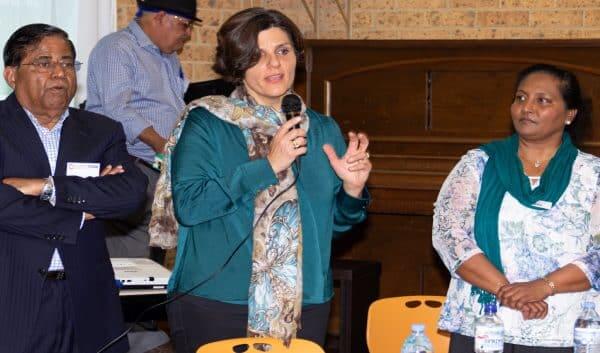The number of elder abuse cases being reported to authorities has seen a sharp spike in recent years. When Nalika Padmasena, a solicitor with Seniors Rights Service said this at a recent Indian community event, there was no mistaking that this has become a serious issue that needs immediate attention.

She was speaking at an event organised by AASHA, a volunteer-based organisation that facilitates culturally appropriate aged care and advocacy services.
Entitled Everyone Deserves Respect, the event presented information about services available and seniors rights that will ensure their financial and social lives are protected. It was held in association with Seniors Rights Services and Centrelink.
Bijinder Duggal and Diana Bernard, moderating, pointed out that CALD seniors are more at risk of abuse due largely to cultural factors pertaining to a greater community orientation. A culture of trust within the family, sharing of resources without paperwork, and decreased access to services were all identified as causative factors. Its important to spread awareness of seniors rights.
What counts as elder abuse? This was detailed by means of two short films prepared by the Victorian Multicultural Commission. One film identified a family scenario in which financial abuse was occurring at the hands of an unemployed and gambling-addicted adult son. The second film showcased psychological abuse, as a young couple forced their aging mother with unrelenting child care tasks with no respect for her needs for independence or even privacy.
The ‘definition’ of elder abuse somewhat established, an expert panel came on to suggest protective measures.

Nalika Padmasena observed, “Senior rights are basic human rights, but are often under-recognized and under-reported, and victims are often under-protected.”
In her own work, she claimed, she looks for abrupt change in circumstances, a sudden confusion about assets, or different stories reported about one’s own situation.
“There are legal remedies available in statutory or common law processes, but often the victims come to us as a last resort, when the financial resources may have diminished.”
Her advice: don’t give out your pin numbers; be careful of signing legal documents; get advice independently.
Evonne Kalafatas, Department of Human Services, Older Australians Line, added, “Be cautious when a family member asks for a personal loan, or to be a guarantor, or sell the family home, or financial help with divorce. Seek the help of a social worker.”
She added, “Deal with someone you can trust, even if that means finding someone who speaks your language.”

She spoke of her own outreach into her Greek community, where she was able to connect better with seniors as compared to others not of the community. “We need language-speaking people to work in aged care,” she reiterated.
She also listed other services such as specialist domestic and family violence officers at police stations; social workers who can assess if you need to move out of the family home, and even senior workers who can help with social goals, outings, transport needs and interpreting services.

Dr Proful Valanju, GP, suggested you could reach out to your family physician if you feel the need. “Your GP will probably be able to identify the problem, being your first point of contact outside the family, and as they guide you through MyAgedCare. Doctors are perfectly positioned to gain the confidence of seniors and become the conduit for available services.”
Sadly, elder abuse does not have to be reported, like child abuse is reportable. But fortunately legal protections are available.
All three panelists were in agreement about the conclusion that seniors must have that power of attorney sorted out for their protection in money management matters, and a guardianship for care and health needs.
Earlier, special guests Jodi McKay Leader of the Opposition in NSW and Joseph LaPosta, CEO of Multicultural NSW, spoke about aged care from a policy perspective.
Jodi McKay was particularly scathing about the government’s current position. “We have funding for languages and for festivals, but there’s little attention paid to multicultural seniors. This is a massive gap in our multicultural policy. When I become Premier, I will help shape policy to ensure respect to our seniors when they are at their most vulnerable.”
Joseph LaPosta agreed that the government has been a lot better at the other end of the spectrum. “I agree with everything that Jodi has said,” he claimed, adding, “We must prioritise aged care. With proper community consultation we will be able to guide policy better.”
This is where initiatives like AASHA and community stakeholders like Bijinder Duggal can provide valuable insight.
Book-ending the information forum, AASHA organised free health checks for the seniors, afternoon tea and cultural entertainment.

Photos: Vishal/Evergreen Memories
Understanding elder abuse

Reading Time: 4 minutes



